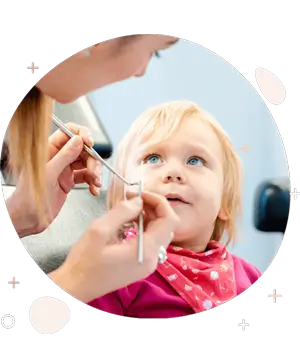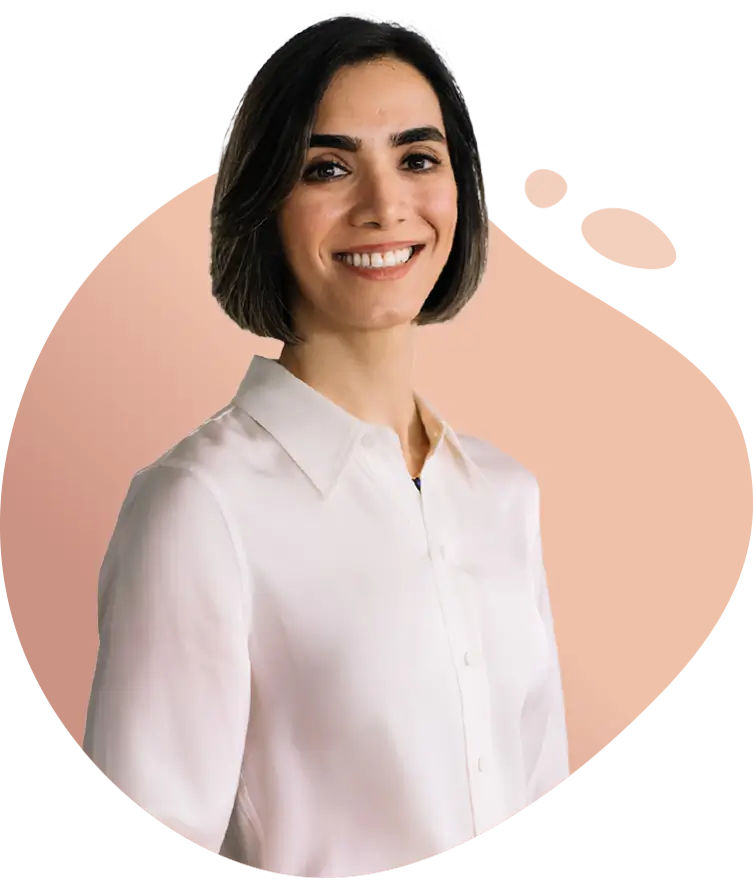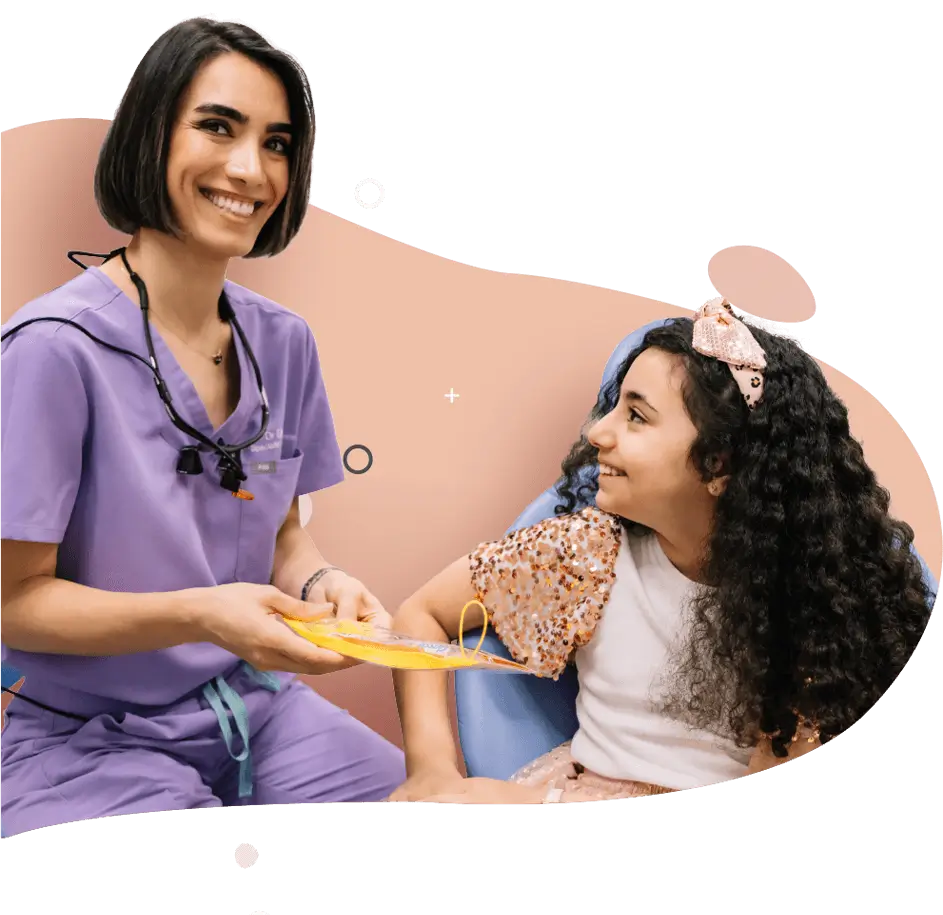Dental Treatment for Children
Paediatric dentists specialise in dental care for children with special needs, including those with developmental disorders, neurological conditions, genetic anomalies, and immune system challenges. Their expertise also extends to managing dental anxiety, trauma, and conditions like cleft lip and palate, ensuring every child receives tailored, compassionate care for a healthy smile.



Dental Care
For Children
Paediatric dentists provide specialised dental care for children: from preventative care, early orthodontic assessment, dental injury treatments, oral health education and gum disease management. Paediatric dentists address dental concerns linked to chronic conditions and ease kids' dental anxiety with Happy Gas or Sleep Dentistry.
Sleep Dentistry
Stainless Steel Crown
Anaesthesia
Happy Gas
Child Dentistry
Tooth Extraction


Our Mission
A Healthy Smile
Paediatric dentists focus on child-specific dental care, from prevention to restoration. Their clinics offer a welcoming environment, emphasizing early education on oral habits. They monitor growth, address trauma, provide restorative treatments, and cater to special needs. Collaborating with other healthcare experts, they ensure a holistic approach to a child's health, laying the groundwork for lifelong dental well-being.
Paediatric dentists play a critical role in ensuring that children have healthy smiles. Their specialised training and focus on child-centred care make them uniquely equipped to manage the dental health of infants, children, adolescents, and those with special needs.
- Child-Centric Environment: Paediatric dental clinics are typically designed with children in mind. Bright colours, fun themes, child-friendly equipment, and a generally welcoming atmosphere help children feel at ease, reducing anxiety associated with dental visits.
- Preventative Care: Prevention is a cornerstone of paediatric dentistry.
- Regular check-ups allow the dentist to detect potential problems early.
- Cleanings remove plaque and tartar that can lead to cavities.
- Fluoride treatments and dental sealants are applied to protect teeth from decay.
- Education and Habits: Paediatric dentists spend significant time educating children and their parents about:
- Proper brushing and flossing techniques.
- Dietary habits that promote oral health.
- The effects of thumb sucking, pacifier use, and bedtime bottles on dental health.
- Growth and Development Monitoring: By regularly examining a child’s teeth, jaw, and bite, paediatric dentists can anticipate and address developmental issues. This includes ensuring there’s enough space for incoming permanent teeth and offering early orthodontic intervention if needed.
- Caries Risk Assessment: This helps predict the risk of developing cavities and allows for personalized preventive strategies.
- Restorative Dentistry: If a child has cavities, paediatric dentists use tooth-coloured fillings, crowns, and other restorative techniques to repair teeth and restore their function.
- Trauma Management: Kids are prone to falls and injuries. Paediatric dentists are trained to handle dental emergencies like broken or knocked-out teeth.
- Anxiety and Pain Management: Recognizing that many children are fearful of dental procedures, paediatric dentists are trained in techniques to make children more comfortable, from distraction methods to the use of sedation or general anesthesia when necessary.
- Special Needs Care: Children with physical, developmental, mental, sensory, behavioural, cognitive, or emotional conditions often require a specialized approach. Paediatric dentists have the training and experience to provide care tailored to these children’s unique needs.
- Interdisciplinary Approach: Paediatric dentists often collaborate with other healthcare providers, ensuring a comprehensive approach to a child’s health. For instance, they might work with pediatricians, ENT specialists, or speech therapists, depending on the child’s needs.
- Building a Positive Dental Attitude: By offering positive experiences from an early age, paediatric dentists help children develop a favourable attitude towards dental care. This positive outlook can influence their dental hygiene habits and attitudes for a lifetime.
Paediatric dentists offer a wide range of treatments tailored to the dental needs of children. Their specialised training prepares them to handle preventative measures and more intensive treatments. The services and treatments provided by paediatric dentists include:
Management of Dental Anxiety in Children
Two common methods to manage dental anxiety and ensure a painless experience for children are the use of laughing gas (relaxation) and general anaesthesia (full sleep).
Relaxation with Happy Gas
Happy Gas (or laughing gas), is a tool often employed by paediatric dentists to create a more comforting and relaxed environment for children during dental treatments. This mild sedative is particularly useful for alleviating minor dental anxieties in children. When used, laughing gas is combined with oxygen, allowing the child to inhale the mixture through a small mask placed over their nose. It's important to understand that the mask's fit is important for the delivery of the happy gas and the effectiveness of the treatment.
Generally, Happy Gas is recommended for children aged three and above. This age consideration stems from the fact that younger children might not have a nasal structure suitable for the mask, leading to an improper fit. Additionally, very young children might find the mask intimidating or may not be able to breathe consistently through their nose, which is essential for the gas's effectiveness. If a child is under three or has heightened anxiety, other options, like sleep dentistry, might be more appropriate and effective.
Generally, Happy Gas is recommended for children aged three and above. This age consideration stems from the fact that younger children might not have a nasal structure suitable for the mask, leading to an improper fit. Additionally, very young children might find the mask intimidating or may not be able to breathe consistently through their nose, which is essential for the gas's effectiveness. If a child is under three or has heightened anxiety, other options, like sleep dentistry, might be more appropriate and effective.

Full Sleep with General Anaesthesia
Sleep dentistry is often chosen for very young children who might not cooperate with standard treatment methods. It's also used when children need to remain still during lengthy procedures that demand precise care.
Sleep dentistry, where general anaesthesia is used, offers paediatric dentists a solution for children who might find traditional treatments challenging. Key reasons include the necessity for precision in certain procedures where movement can hinder success or even pose risks. It's also beneficial for extensive treatments, allowing multiple procedures in one sitting. Very young children, often uncomprehending of dental processes, may also benefit from this approach, ensuring they remain calm and still.
Children with specific medical conditions or developmental challenges, such as ADHD and ASD, might find regular dental visits overwhelming. ADHD can make prolonged stillness difficult, while ASD children can be overstimulated by the dental environment. Other conditions, like anxiety disorders or past traumatic dental experiences, also make sleep dentistry a viable option. It's crucial, however, for parents, dentists, and pediatricians to collaboratively decide on using anaesthesia, weighing its benefits against potential risks.
Sleep dentistry, where general anaesthesia is used, offers paediatric dentists a solution for children who might find traditional treatments challenging. Key reasons include the necessity for precision in certain procedures where movement can hinder success or even pose risks. It's also beneficial for extensive treatments, allowing multiple procedures in one sitting. Very young children, often uncomprehending of dental processes, may also benefit from this approach, ensuring they remain calm and still.
Children with specific medical conditions or developmental challenges, such as ADHD and ASD, might find regular dental visits overwhelming. ADHD can make prolonged stillness difficult, while ASD children can be overstimulated by the dental environment. Other conditions, like anxiety disorders or past traumatic dental experiences, also make sleep dentistry a viable option. It's crucial, however, for parents, dentists, and pediatricians to collaboratively decide on using anaesthesia, weighing its benefits against potential risks.

xx
x

x
x
xxx
General Dentistry
Aesthetic Dentistry
Teeth Whitening
Child Dentistry


Tiny Smiles
Everyday!
Paediatric dental treatments optimised for children in Brisbane.


Reviews
Louise Gibson
“Dental Treatment for Children”
Dr Ellie was absolutely superb. She performed dental work at St Andrew’s on our five year old and was extremely patient, kind and calming. Our son has special needs as well as having endured lots of medical procedures (which makes him very nervous of medical intervention). Her approach was very reassuring for all of us. Thank you, the Bersz Family ❤️
Courtney Turner
“Dental Treatment for Children”
The level of compassion, respect and understanding for her patients is unmatched. Her work is wonderful and completely put us at ease sending in our 3 year old.
Nick Bright
“Dental Treatment for Children”
We love Dr Ellie, she has been amazing with making our boy comfortable and her dental work has been awesome. 100% recommend her for children.
Andrew Stapleton
“Dental Treatment for Children”
Dr Ellie and her staff provided outstanding professionalism and experience with a personal touch. Dr Ellie was genuinely warm and compassionate with our little boy. Her professional advice was considerate and comforting. She demonstrated a great deal of integrity with her fees which was very much appreciated. I would highly recommend her for your specialist dental needs.
Maryam Montafej
“Dental Treatment for Children”
Dr Ellie is extremely professional, knowledgeable and caring. Her approach with my daughter was so amazing at the first visit (2.5 years old) that now she looks forward to her dental appointments. If you are looking for the best Paediatric dentist, look no further. Dr Ellie is truly the best.